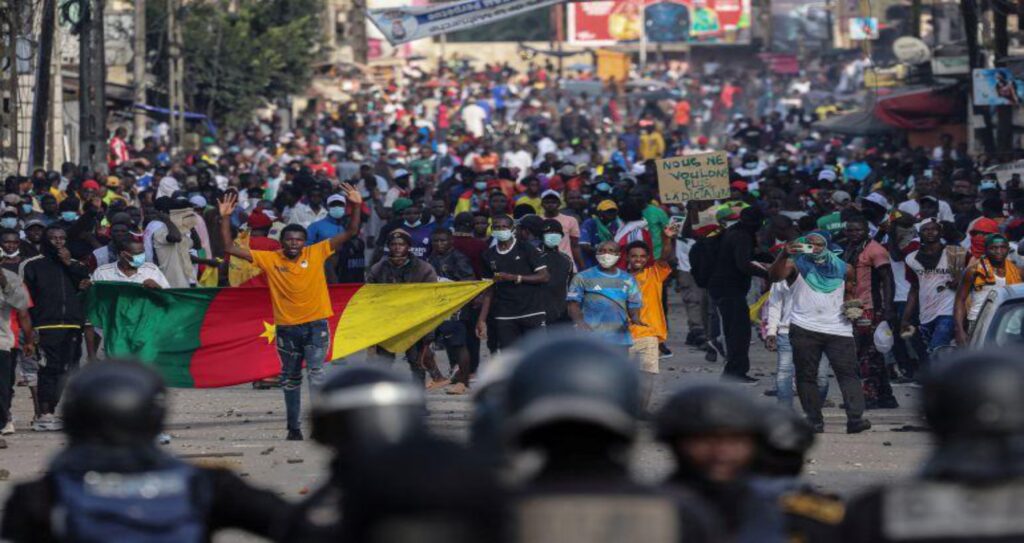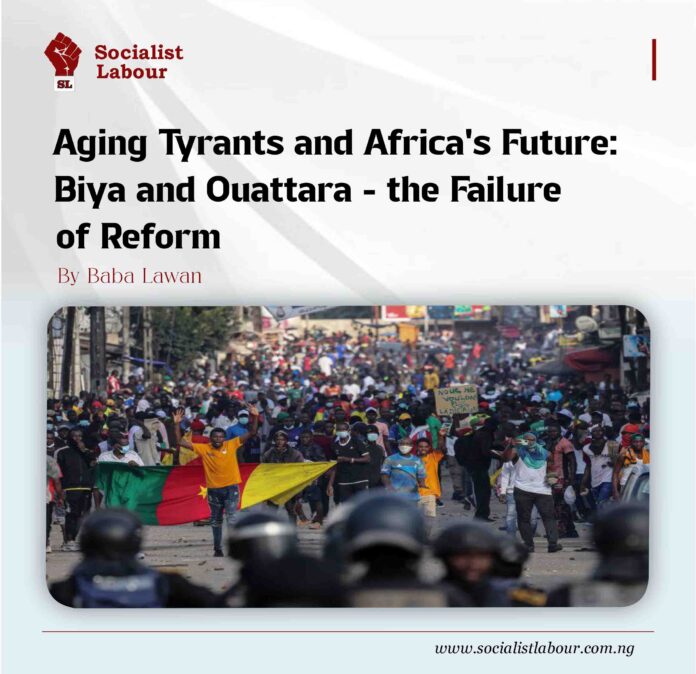By Baba Lawan

Protests over elections in Douala, Cameroon
What does it say about democracy when people continue to re-elect men who have long outlived his political prime? The recent claimed electoral victories of Paul Biya, Cameroon’s 92-year-old president, and Alassane Ouattara, the 83-year-old president of Cote d’Ivoire are not just further chapters in their long rule — it is a reflection of Africa’s deeper democratic fatigue. Across the continent, citizens go to the polls only to confirm what they already know: the same names will win, the same promises will be made, and the same failures will be repeated.
The survival in power of Biya and Ouattara, despite their ages and distance from their people, is a metaphor for Africa’s unfinished democratic story — one where reform is forever discussed but rarely achieved. The successful uprising in Madagascar shows that another future is possible.
The Longevity of Power
Paul Biya came to power in 1982, when many African nations were still reeling from coups, civil wars, and the turbulence of postcolonial leadership. Over forty years later, he remains at the helm — outlasting Cold War politics, international transitions, and the rise of entire new generations.
But Biya’s longevity is not a triumph of leadership; it is a symptom of a continent trapped in its past. His rule has been defined not by innovation or reform but by endurance — the quiet, calculated endurance of a man who mastered the politics of staying rather than serving. Biya’s main opponent was prevented from contesting in the elections.
Ouattara first came to power following the 2010-2011 presidential clash between him and Laurent Gbagbo, which cost more than 3,000 lives among their supporters. He claims to have won a fourth term after a change to the constitution. The two main opponents were banned from standing.
Like Yoweri Museveni in Uganda and Teodoro Obiang Nguema Mbasogo in Equatorial Guinea, Biya and Ouattara have turned time into a weapon. Through constitutional manipulation, co-opted institutions, and a loyal military elite, they have made their presidency synonymous with the state itself. In Cameroon, to criticize Biya is to be accused of threatening national unity.
When Democracy Becomes Theatre
In modern Africa, democracy has too often become a ritual without meaning. Elections are held regularly, but power rarely changes hands. Ballot boxes are filled, votes are counted, and victory is declared — yet the result is predetermined.
Cameroon’s political landscape reflects this illusion perfectly. Opposition parties are divided, intimidated, or bought off. Electoral commissions are loyal to the presidency. Voters go to the polls not in hope, but in resignation — a civic duty performed more out of habit than belief.
This hollow democracy, where form replaces substance, is what keeps aging rulers in power. It is not that Africans love tyranny; it is that the systems designed to protect democracy have been quietly dismantled by those meant to defend it.
The Failure of Reform
Every African strongman promises reform — Biya included. He has spoken for years about modernization, decentralization, and dialogue. Yet Cameroon remains divided by the Anglophone crisis, plagued by corruption, and economically stagnant.
Reform under Biya, as under many long-serving rulers, is more rhetorical than real. It serves to appease international donors and silence domestic critics. In practice, reform is never intended to change the system — only to preserve it.
The result is a political paradox: governments that speak the language of democracy while practicing the logic of monarchy.
A Continent Held Hostage by Its Elders
Africa’s greatest contradiction is demographic. It is a continent of youth led by the very old. Over 60% of Africans are under 25, yet some of their presidents are approaching or surpassing 90. This generational imbalance has turned politics into inheritance — where old men make decisions about futures they will not live to see.
In Cameroon, the average citizen is much younger than Biya’s time in power. Most have never witnessed a peaceful transfer of authority. This is not stability; it is stagnation.
Across Africa, from Sudan to Zimbabwe, from Uganda to Congo, the story is the same — nations with dynamic populations trapped under the weight of outdated leadership. Young Africans are migrating not only for economic opportunity but also for political freedom, fleeing systems that refuse to evolve.
Why Voters Still Choose the Old Guard
One might ask: why do voters keep returning these leaders to office? The answer lies in the mechanics of fear and fatigue. Citizens who have lived under decades of control grow accustomed to survival politics — where opposing the state feels dangerous and change seems impossible.
Elections become acts of self-protection, not empowerment. Many Africans vote for the devil they know, not because they love him, but because they fear the chaos that might follow his departure.
This is the psychological legacy of dictatorship: the internalization of hopelessness.
The International Complicity
The endurance of Africa’s aging rulers is not solely an African failure. Western governments and international organizations often turn a blind eye in the name of “stability.” Paul Biya, for instance, has long been treated as a dependable partner in Central Africa — reliable in security cooperation, even if undemocratic at home. Ouattara in Cote d’Ivoire also remains a dependable partner for the French government.
The global hypocrisy is clear: democracy is demanded in rhetoric but sacrificed in practice whenever stability or economic interest is at stake. As long as Biya and Ouattara keep their governments predictable, the world remains silent.
The Future That Awaits
But history is unkind to men who mistake longevity for legitimacy. Biya’s re-election may appear like a victory, but it is actually a warning — for him and for others like him. Nations that fail to renew leadership eventually collapse under their own weight. The fall of Ali Bongo in Gabon and Robert Mugabe in Zimbabwe proves that no strongman is eternal.
The general strike and mass protests in Madagascar managed to overthrow their president in less than three weeks. The uprising should give confidence and inspiration to all socialists and democrats. This is just one example of the multiple popular uprisings that are taking place across the world.
The question for Africa is not if change will come, but when and how. The longer genuine reform is delayed, the more violent its arrival becomes.
Conclusion: When Time Becomes the Enemy
The claimed presidential victories in Cameroon and Cote d’Ivoire expose the exhaustion of African democracy. A continent that once dreamed of liberation is now held captive by its liberators.
The path forward lies not in clinging to aging rulers, but in embracing generational renewal and an end to increasing inequality and corruption. Africa needs leaders who can speak the language of its youth, not the slogans of its past. Reform must stop being a promise and start being a process.
Until that happens, elections will remain rituals of repetition, and democracy will continue to age — just like the men who refuse to leave power. Cameroon and Cote d’Ivoire may indicate our future in 2027 and beyond.






